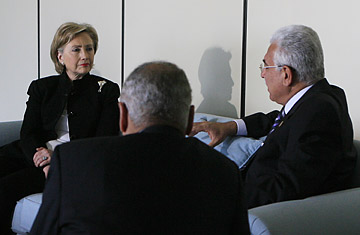
Secretary of State Hillary Clinton meets with Egyptian Prime Minster Ahmed Nazif, right, and Foreign Minister Ahmed Abul Gheit before a conference in the Egyptian Red Sea resort town of Sharm el-Sheikh on rebuilding the Gaza Strip
TIME: What is the state of the peace process as Clinton arrives in the Middle East?
Telhami: The big picture, whether or not we have short-term violence on the Israeli-Gaza front, is that the time is running out on the two-state solution. Now we have Gaza and the West Bank separated politically between Fatah and Hamas, as well as geographically. We have settlements expanding in the West Bank and around Jerusalem. Israeli-built roads and other infrastructure are transforming the reality on the ground. (See pictures of Gaza after the three-week war.)
Can't settlements be removed if there is a peace agreement that is acceptable to both sides?
One can talk about removing settlements, but it becomes more difficult every day. Since the collapse of the Camp David summit in July 2000, some Palestinian and Israeli élites have begun to lose faith in the two-state solution. We see the rise of Hamas, which has a completely different agenda. If you don't have some kind of viable two-state solution, we have a problem on our hands.
What other option is there?
Israelis may feel they are left with unilateral options: take control of most of the West Bank, let Jordan take care of other parts; hope Gaza will go under international or Egyptian control. Hamas advocates one state through military means. Some secular Palestinian élites who oppose military means advocate a one-state solution in which Jews and Arabs are equal. So the consequence is most likely indefinite conflict.
Ultimately, as President George W. Bush said, "We can't want peace more than the parties themselves."
Not having a credible peace process on the Israeli-Palestinian front would spell trouble for American foreign policy choices. Keep in mind that the United States is facing other priorities in the broader region, including two wars and the Iranian nuclear challenge. Issues are linked. Arab-Israeli peace is an American interest, not just charity work.
Are there any positive trends?
Despite the results of the Israeli elections, a majority of Israelis still support the two-state solution. Israeli public opinion from right to left has come to believe that they cannot indefinitely maintain control of the West Bank and maintain Israel as a Jewish democratic state. And almost all Arab states are now anxious to see a peace deal.
Then what's holding up an agreement in which Israel would return the West Bank in exchange for peace with the Palestinians?
The devil is in the details. While they have in principle come to agree that West Bank and Gaza will be a Palestinian state, there are other things that are important like actual boundaries, the future of Jewish settlements, the return of Palestinian refugees and the status of Jerusalem.
Will Clinton and special envoy George Mitchell have a more difficult challenge as mediators if hard-line Likud leader Benjamin Netanyahu is Prime Minister?
Historically, it has been more challenging for American Administrations to deal with Likud-led governments in Israel. But I never believed that, on issues that are central to you, you can afford to wait until there is a "ripe" environment. If the issue is central, diplomacy has to work hard to ripen the environment for a deal.
So, what should Obama and his envoys do?
The only way American diplomacy will succeed in mediating serious progress and an ultimate end to the conflict is if you have a President of the United States who thinks it's an important issue and makes it a priority. I don't mean that you simply send the Secretary of State and a special envoy. I mean being prepared to pay a price in diplomacy and politics in bringing to bear all the instruments of American diplomacy on foreign partners, Palestinian and Arab, Europeans and Israelis, and at home in the Congress. So far, President Obama has said clearly that mediating Middle East peace is important to him and to Secretary of State Clinton. The Bush Administration certainly never fully accepted that this conflict should be a central American priority.
Can't the parties reach a settlement without U.S. involvement? The Norwegians negotiated the Oslo accords.
I don't think they can clinch a final settlement without America. Palestinian and Israeli politics will remain somewhat fractured. It is difficult to envision that they can make the tough concessions both are going to have to make.
